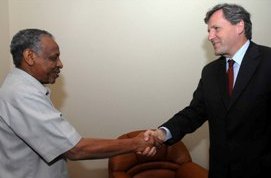UN peacekeeping chief tours Sudan, meets with officials
October 12, 2008 (KHARTOUM) – United Nations Under-Secretary-General for Peacekeeping Operations Alain Le Roy toured Darfur and on Sunday held a series of meetings with Sudanese government officials in Khartoum, the UN-African Union hybrid peacekeeping mission (UNAMID) announced.
 The new peacekeeping chief, who was appointed in August to oversee almost 110,000 personnel serving in 20 peace operations around the world, has never been to Sudan, which is set to become the site of the world’s largest peacekeeping mission. The peacekeeping chief is seeking to familiarize himself with the situation and meet influential figures.
The new peacekeeping chief, who was appointed in August to oversee almost 110,000 personnel serving in 20 peace operations around the world, has never been to Sudan, which is set to become the site of the world’s largest peacekeeping mission. The peacekeeping chief is seeking to familiarize himself with the situation and meet influential figures.
The Under-Secretary General met with Foreign Minister Deng Alor, Presidential Assistant Nafi Ali Nafi, National Security Director Salah Abdallah Gosh, and Ministry of Foreign Affairs Undersecretary Mutrif Siddiq.
After meeting with Nafi, Le Roy told journalists that the discussion had focused on the UN’s role in the Sudan through the presence of UNAMID.
“Both the Government of Sudan and the United Nations are committed to accelerate the deployment of UNAMID,” Le Roy said. He welcomed last week’s tripartite meeting in Khartoum between Government, UN and the AU, which he said would speed up deployment of the force in the coming weeks and months. Current plans call for deploying at least another 4,500 troops by the end of this year, bringing the mission to about 65 per cent of its mandated 26,000 troops and police.
Asked about the Darfur security situation, Mr. Le Roy noted that the situation had improved recently but that there were still serious concerns about banditry and potential clashes.
The political process offered the only means to achieve peace, he stressed, noting that AU-UN Chief Mediator Djibril Bassole is working hard to engage the main actors in order to reach a framework agreement. Le Roy also welcomed a Qatari initiative in support of the chief mediator’s work.
AU-UN Joint Special Representative Rodolphe Adada and the Secretary-General’s Special Representative in Sudan Ashraf Qazi accompanied Le Roy on his visit.
Last week Le Roy toured Darfur. On Wednesday he met with internally displaced persons (IDPs) representatives in El Fasher.
The next day he met in El Fasher with former rebel leader Minni Minawi, leader of the Sudan Liberation Army (SLA/MM), who was the only main rebel leader to sign a peace agreement with the government in May 2006.
On Friday, the Under Secretary-General together with Joint Special Representative Rodolphe Adada and UNAMID Force Commander General Martin Agwai and other senior UAMID officials visited the mission’s sector headquarters in El Geneina, West Darfur. Le Roy also visited the governor of West Darfur, Abu Ghassim, who promised to work for dialogue among the various combatants so that IDPs can return to their homes.
Later that day, the delegation flew to Nyala, South Darfur where they spent the evening. While in South Darfur, Le Roy met with Deputy Governor Farah Mustafa and visited Kalma IDP camp.
Le Roy and the sheiks of Kalma discussed the security situation in and around the camp and the restriction of oil supplies needed to provide clean water to the camp. The sheiks requested that UNAMID increase their deployment in the region to protect civilians, but they also expressed gratitude to UNAMID for recently providing a day-and-night presence in the camp.
The Under Secretary-General concluded the third leg of his trip in Darfur by visiting the UNAMID Labado Team site. Labado was razed in 2004 but subsequently became a base site. Juma Hagar’s forces – government-aligned troops with Minnawi’s SLM – clashed with the old AMIS peacekeeping mission near Labado in 2007.
Le Roy also earlier visited Southern Sudan as part of his week-long tour, where the UN fields a separate mission to monitor a 2005 peace agreement between the government of Sudan and a warring party distinct from the rebels in Darfur, the Sudan People’s Liberation Movement.
Some 2.7 million people have been displaced and 300,000 killed across Darfur, where rebels have been fighting government forces and government-backed janjaweed militias since 2003.
(ST)
